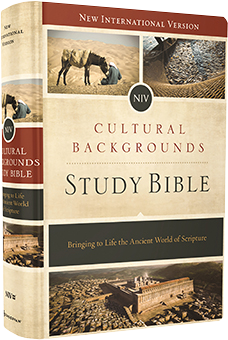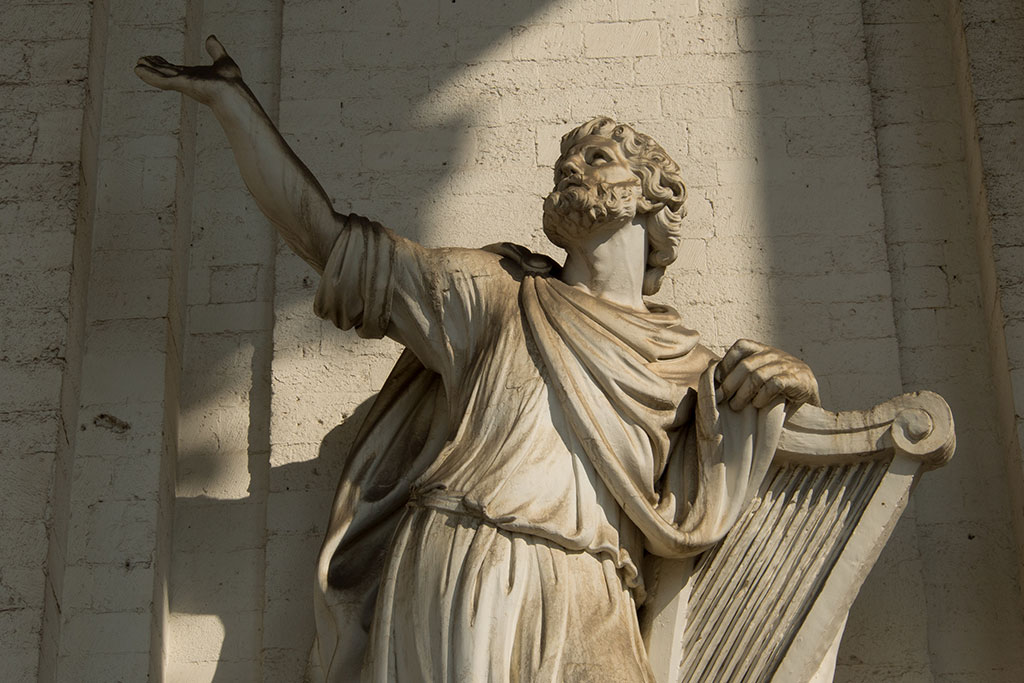
The Beatitudes in the Bible
Jesus spoke the beatitudes, or blessings, to a large crowd who had gathered to hear him speak. These people had heard of the wonder-working prophet who was making his way around the countryside, and they came to see Jesus for themselves.
What did the crowd look like who heard these words for the first time? Matthew 4:23–25 reads,
“Jesus went throughout Galilee, teaching in their synagogues, proclaiming the good news of the kingdom, and healing every disease and sickness among the people. News about him spread all over Syria, and people brought to him all who were ill with various diseases, those suffering severe pain, the demon-possessed, those having seizures, and the paralyzed; and he healed them. Large crowds from Galilee, the Decapolis, Jerusalem, Judea and the region across the Jordan followed him” (emphasis added).
People from a wide-ranging area had heard about Jesus and his miracles, so they flocked to see who this man was, what he had to say, and to discover whether he could help them. These people were hurting. They were looking for relief for their physical ailments, but they were also looking for encouragement in the midst of their social and political woes.
Likely a large portion of the crowd who thronged to Jesus that day consisted of observant Jews who understood that there was coming a historical figure of whom the prophets had spoken and written about. This individual would one day restore order and rule to those who followed the one and only God.
These Jewish people longed for the day when their earthly situation would be made right once again. They had learned about the glory days in Jewish history: the days during the reigns of David and Solomon, when Israel was a wealthy, self-governing political power. And they longed for these distant days to be realized again.
Encouraging Words for the Oppressed
When Jesus walked the earth, God’s chosen people suffered under the rule of an overwhelmingly strong occupying force. Rome was the dominant political presence in the region, and the soldiers that they saw in the streets every day treated the residents of the Holy Land like any occupying force would: they were brutally efficient in maintaining order, and they exacted a heavy toll on the population. Literally every family in Israel saw and felt the impact that foreign rule had on them. They were cowed and humbled under this harsh regime and were looking for relief. When would God put everything right again?
Jesus’ words as recorded in Matthew 5 must have come to them as a puzzling but welcome announcement. Whether or not this ragged, miracle-working prophet wandering the countryside with his band of disciples was the promised Messiah, his words spoke to the hearts of an oppressed and broken population. Read these verses with this background in mind:
“Blessed are the poor in spirit,
for theirs is the kingdom of heaven.
Blessed are those who mourn,
for they will be comforted.
Blessed are the meek,
for they will inherit the earth.
Blessed are those who hunger and thirst for righteousness,
for they will be filled.
Blessed are the merciful,
for they will be shown mercy.
Blessed are the pure in heart,
for they will see God.
Blessed are the peacemakers,
for they will be called children of God.
Blessed are those who are persecuted because of righteousness,
for theirs is the kingdom of heaven.
Blessed are you when people insult you, persecute you and falsely say all
kinds of evil against you because of me. Rejoice and be glad, because great
is your reward in heaven, for in the same way they persecuted the prophets
who were before you.” — Matthew 5:3–12
Surely Jesus’ words to the crowd that day instilled hope in their hearts. His words resonated with passages that they had heard in the teachings on which they had been raised, such as the words the prophet Isaiah had spoken to the people of Israel some 700 years before:
“Nevertheless, there will be no more gloom for those who were in distress. In the past he humbled the land of Zebulun and the land of Naphtali, but in the future he will honor Galilee of the nations, by the Way of the Sea, beyond the Jordan—
“The people walking in darkness
have seen a great light;
on those living in the land of deep darkness
a light has dawned.
You have enlarged the nation
and increased their joy;
they rejoice before you
as people rejoice at the harvest,
as warriors rejoice
when dividing the plunder.
For as in the day of Midian’s defeat,
you have shattered
the yoke that burdens them,
the bar across their shoulders,
the rod of their oppressor.
Every warrior’s boot used in battle
and every garment rolled in blood
will be destined for burning,
will be fuel for the fire.
For to us a child is born,
to us a son is given,
and the government will be on his shoulders.
And he will be called
Wonderful Counselor, Mighty God,
Everlasting Father, Prince of Peace.
Of the greatness of his government and peace
there will be no end.
He will reign on David’s throne
and over his kingdom,
establishing and upholding it
with justice and righteousness
from that time on and forever.
The zeal of the Lord Almighty
will accomplish this.” — Isaiah 9:1–7
Jesus came working miracles, healing the sick, restoring the disabled, and teaching a message of hope. On hearing his teaching, the gathered masses must have wondered, could they be on the cusp of the historic reversal of their fortunes for which they had been waiting for centuries? We who have the perspective of thousands of years and the New Testament at our disposal know that there was definitely kingdom work at hand when Jesus spoke these words.
Let’s take a closer look at the structure of the beatitudes.
What Are the Beatitudes?
This series of blessings that Jesus pronounced at the beginning of his ministry described the present and coming kingdom of God. Kingdom beatitudes also occur in Luke 6:20–22, and Jesus speaks general blessings on other occasions such as in Matthew 11:6, Luke 11:28, and John 20:29.
The first and eighth beatitudes in Matthew envelop the others with the promise of the kingdom itself (Matthew 5:3,10). The first beatitude in Luke also promises the kingdom (Luke 6:20).
In all four blessings in Luke and the first four in Matthew, the most unlikely of people are pronounced blessed—the poor, the hungry, the meek. They are downtrodden and tired, yet because they have lived to see the day of God’s benevolent rule being established in this world, Jesus pronounces them blessed. Jesus confirms what they have hoped for all along: as God comes to reign, he will right all wrongs, and everyone who lives to see and welcome his rule—even and especially the downtrodden—will be blessed.
The second four beatitudes in Matthew 5 focus on those who join in God’s great restoration and reversal-work of mercy and justice. Jesus pronounces blessings on those who enact mercy, integrity, peace, and righteousness or justice (Matthew 5:7–10).
The pronouncements or promises express reversals of expectation—those who are hungry will be satisfied, those who mourn will be comforted and laugh, and those who are meek will inherit the whole earth. As God’s reign is established in this world, its effects will be life-changing for those who most need mercy and justice and for all those who share in Jesus’ ministry.
What Kind of Kingdom Were the People Looking For?
In Biblical languages, the term translated into English as “kingdom” usually meant “reign,” “rule,” or “authority.” Jewish people recognized that God reigned as king over the world he created (Psalm 22:28; 145:12–13; Daniel 4:3,34). Some felt that they affirmed this when they regularly recited the Shema, acknowledging that there was just one true God: “Hear, O Israel: The Lord our God, the Lord is one” (Deuteronomy 6:4).
But while Jewish people acknowledged God’s present rule, most looked for God’s unchallenged reign in the age to come (Daniel 2:44–45; 7:14,27). Many prayed regularly for God’s future kingdom—for him to reign unopposed, to fulfill his purposes of justice and peace for the world. One familiar prayer that came to be prayed daily was the Kaddish, which in its ancient form began: “Exalted and hallowed be his great name … May he cause his kingdom to reign.”
By Jesus’ day, many were familiar with Daniel’s prophecy about four kingdoms that would rise and fall, and they believed the fourth and final kingdom represented in those writings to be the current Roman Empire (Daniel 2:37–43). Daniel prophesied that in the time of that fourth kingdom, God would establish an eternal kingdom, overthrowing the other ones (Daniel 2:44). This kingdom belonged to a “son of man,” a human one, whose rule was associated with the deliverance of God’s people and contrasted with the preceding empires that were compared with beasts (Daniel 7:12–14,17–18,21–22).
Daniel spoke of these truths as “mysteries” (Daniel 2:28–29; cf. 2:47). Thus, it is not surprising that the Gospels speak of the “secret” or “secrets” of the kingdom (Matthew 13:11; Mark 4:11; Luke 8:10).
All these things were the backdrop for the words this crowd heard Jesus speak that day.
The Beatitudes for Us Today
When Jesus spoke these words, he introduced these revolutionary concepts to a people who desperately needed to hear them. The oppressed people lined up with hopes and dreams, and these teachings connected to their hearts in a way that far surpassed their hopes for mere physical healing, as important as that was to all who came to Jesus. But what do the beatitudes mean for us today?
Jesus’ words are no less radical to those today who read or hear them for the first time. For all of our modern conveniences and medical advances, the world is still a sin-stricken place filled with suffering brought on by dark social, political, and physical realities.
What kinds of things weigh on your heart today? Are you suffering under the weight of physical disability? Of a frightening diagnosis? Of financial stress? Read Jesus’ words from Matthew 5 again with your personal struggles in mind.
Jesus came to introduce the kingdom of God to all who would believe in him and accept God’s offer of eternal life. Through the work of the Holy Spirit and the community of faith, the kingdom of heaven breaks into our dark world bringing relief and encouragement for our hearts and minds today. Jesus offers life and peace and perspective that allows us to rise above our current circumstances; his words instill hope for eternity that fills our minds with anticipation for what is to come, and with real power for living our lives in the everyday hope that the Bible offers.
Be encouraged. Jesus is leading the kingdom of God and directing its growth in the world today. Despite the darkness and perversity of this world, God is still very much in control and is working to establish his rule and reign in the hearts and circumstances of those who choose to follow him.
Written by Mike Vander Klipp, a senior editor with the Zondervan Bible Group, where he’s been privileged to work for the past three decades. He and his family live in Grand Rapids, Michigan. Some of the content is adapted from the NIV Study Bible, Fully Revised Edition and the NIV Cultural Backgrounds Study Bible.

NIV Study Bible, Fully Revised Edition
The NIV Study Bible, Fully Revised Edition, gives you just the right amount of study helps exactly where you want them. The study Bible millions have come to trust is now fully updated, guiding your steps as you confidently venture into Scripture.
Learn More
Cultural Backgrounds Study Bible
The NIV Cultural Backgrounds Study Bible brings the ancient world of Scripture to life for modern readers through hundreds of articles, color photos, charts, maps, and more on the customs, culture and literature of biblical times.
Learn More





